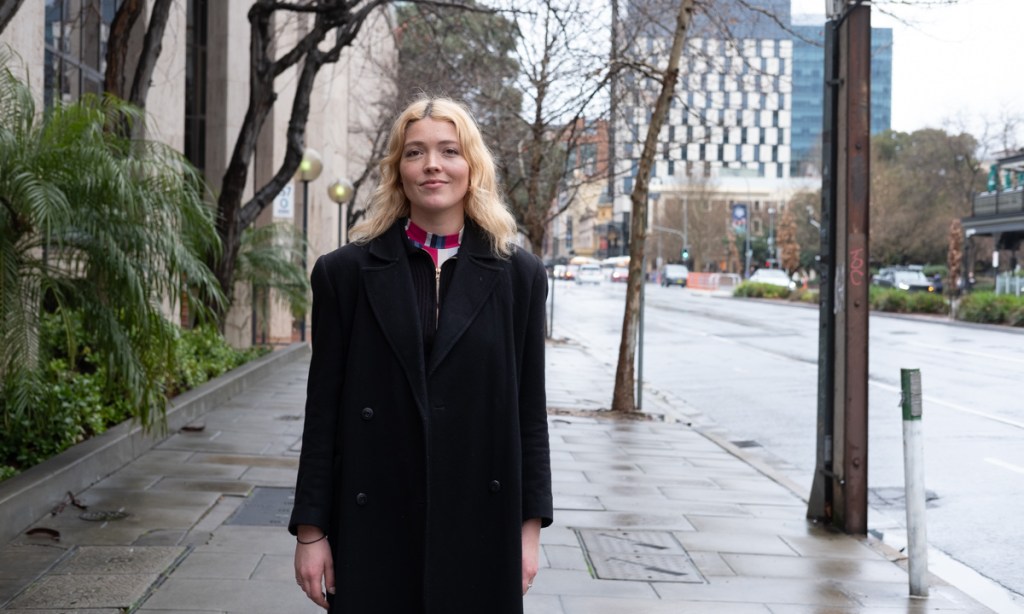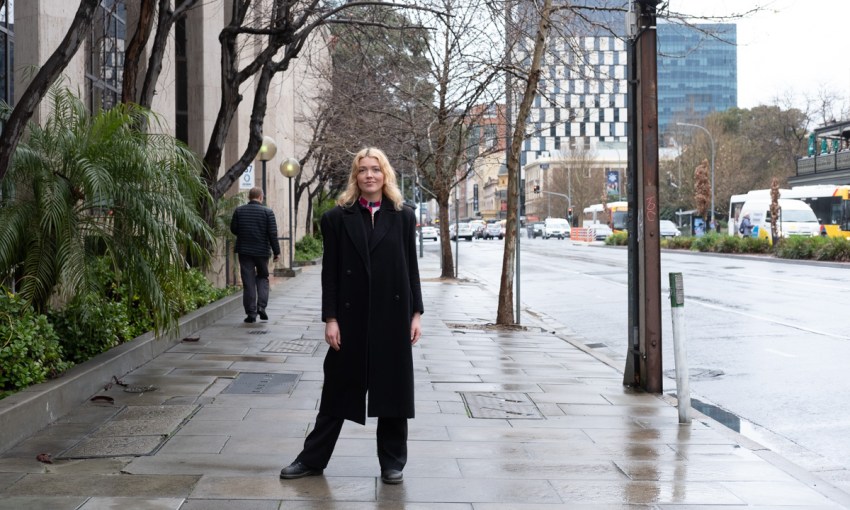Not So Hospitable and We're Equal are two new, locally produced initiatives working to address the widespread problem of sexual assault and harassment in the hospitality industry.
Two new campaigns launch to stop workplace sexual assault
Jamie Bucirde has spent her entire working life in the hospitality industry. She started in a café at “13 or 14”, and moved to Adelaide and joined the hospo community at 17.
This article discusses sexual assault.
If this story raises issues for you, call LifeLine on 13 11 14.
If you have a tip related to sexual assault in hospitality, contact us: cm@solsticemedia.com.au.
This was nine years ago, and she filled her time working at bars, restaurants and clubs – including her mum’s CBD pub, Sparkke at the Whitmore.
Having spent half her life in hospitality, the industry has had a profound effect on the person she is today.
“It teaches you how to deal with humans, you know? It teaches you how to problem solve, it teaches you how to think on your feet, it teaches you to be charismatic, it teaches you to connect, and it brings everyone together,” she says.
“It’s brought me out of my shell, it’s taught me how to be a great communicator.
“I’m a lover of good things, so I love good wine and good food, but it’s really cultivated this amazing community, and that’s been the thing that’s kept me working in hospitality for so long, is the community.”
For everything the world of hospitality has given to Jamie, there are significant drawbacks. Jamie, like the three hospitality workers CityMag recently spoke with, has consistently experienced sexual assault and harassment as a worker in the industry.
This is the second part of a bigger story about a much-celebrated sector in South Australia, which is proving to have problems.
“I’ve experienced that throughout my entire hospitality career,” she says. “And that’s coming from managers, that’s coming from owners, that’s coming from other staff members towards me. So I’m not even talking about the sexual harassment or assault that’s happened from patrons, which has also happened.”

Jamie Bucirde
Jamie is currently a postgrad sexology student and hopes to become a “sexuality educator, and get into the consent and activist space,” she says. She’d known for a long time something needed to be done to address sexual harassment and assault in hospitality, but her degree has given her the confidence “to articulate myself in this space, because I’m also studying it and have the credentials behind me”.
Last week, Jamie launched Not So Hospitable, a wesbsite designed to give people who’ve experienced sexual assault a place to tell their stories. There is a testimonial form on the website through which a survivor can share their story with as much or as little detail as they like.
“You can give your name, you can say the Adelaide venue, you have the option to remain anonymous, if you so choose,” Jamie says. “I also give people the opportunity to [request to] not have their testimonial shared, if they don’t want.”
The platform is modelled on Teach Us Consent, launched by New South Wales sexual consent activist Chanel Contos.
“My close friend actually works as the digital manager for Teach Us Consent, so I’ve gotten feedback directly from that organisation,” Jamie says. “I’ve also done a lot of research within my own field while studying, about how to collect ethical data. But the biggest thing I’ve learned is it’s one of the biggest ways to educate people in the space is through hearing lived experiences.”
Jamie had been contemplating the launch of Not So Hospitable for about two months, but was spurred on to launch the initiative after seeing a wave of spontaneous testimonials appear on social media two weeks ago.
“After you posted that story, I saw that really spread around my social media platforms, and people started sharing their stories, too,” Jamie says.
“It surprised me how many stories there were so quickly and how many people were really angry about it, and I realised that there just isn’t a place to send people to give their testimonies and start collecting these stories.
“Enough people were making noise and giving their experiences that I realised there just needed to be a place to funnel them, to actually start highlighting how bad it is.”
View this post on Instagram
As per the most recent testimonial count published on the Not So Hospitable Instagram account, there have been 281 stories shared to the platform so far. Jamie has started publishing some of the testimonials on the social media page, with information about the survivor and perpetrator removed.
Jamie’s hope for the project is to encourage more people who’ve experienced sexual assault or harassment in the hospitality industry to share their stories, and to garner the attention of leaders in the local hospitality industry and government.
“The objective is to enact positive change. It’s to get legislation. It’s to legislate trainings in these venues. We should have a reporting marshal the same way we have a COVID marshal,” Jamie says.
“We need formal trainings for every venue. That needs to be a tick box that venues do in order to be legally functioning as a venue. And that comes to education on how to report, how to identify toxic workplace behaviour, including sexual assault or sexual harassment, what to do if you see it.
“A lot of people that I know [who] are managers of establishments around Adelaide, I’ve gotten a lot of feedback from them being like, there’s so much weight put on the venue itself to deal with instances of harassment and assault when they’re so out of their depth, because they don’t know how to respond to these instances.
“The hospitality industry is already understaffed and overworked because of COVID, so to add this on top of that isn’t working. So that’s why there needs to be legislative change from people higher up in governments giving people a way to report.”
For more information on Not So Hospitable, see here.
One week before Jamie made the Not So Hospitable website live, the South Australian Commissioner for Equal Opportunity, Jodeen Carney, launched another campaign targetting discriminatory behaviour in the workplace – which includes but is not limited to sexual assault and harassment.
Called We’re Equal, the campaign will focus on the “areas of employment and the provision of goods and services,” Jodeen says, which includes the hospitality industry.
Jodeen says 82 per cent of the complaints her office receives (around 250-300 each year) fall under these categories. The commission launched the We’re Equal campaign pilot, which is running until 16 September, by putting up posters at hospitality venues, such as wine bar LOC.

Jodeen Carney
“Bars, cafés, providers of goods and services is an obvious area for us… so it seemed a good place to start,” Jodeen says.
We’re Equal asks businesses to pledge to “equal-opportunity values and to undertake to provide a safe workplace free from bullying, harassment and discrimination,” Jodeen says. “And that message is sent not just to customers but to their workforce and to their suppliers.
“The campaign is also a bit of a Trojan horse for educating those in the sector, as well as customers, to educate business owners.”
We’re Equal does not require businesses who’ve signed up to the project to comply with any particular behaviours in order to take part; however, Jodeen hopes those who’ve made the pledge will be kept in check by the community.
“We want this to be community-led. People sign up to the campaign,” she says. “If people see that a particular business that has signed up to We’re Equal is not acting appropriately, then they would advise us, they can make a comment on social media, or they can talk to the business, and we’ll make an assessment after that.”
Jodeen says there is “widespread under-reporting” of sexual assault, and she encourages anyone who’s experienced discrimination in the workplace, including survivors of sexual assault and harassment, to contact her office “whenever they can”.
“We can provide them with various advice,” Jodeen says. “Some people don’t want to file a formal complaint. Some people ring our office and say, ‘I just want you to know this happened to me and I don’t want to pursue it further’. We note that, and that’s where trends develop.”
“But I would encourage anyone who feels that they have been discriminated against to contact our office. That’s what we’re there for.”
Jodeen says her office has “limited powers”, but she has facilitated conciliations between workplaces and staff who’ve made complaints.
For more information on the We’re Equal pilot campaign, visit the website.
If you’ve experienced rape or sexual assault, Yarrow Place is a free and confidential service for people over 16 and offers counselling, advocacy and medical support.
Call 1800 817 421 or 8226 8777 or visit their website.
You can also call 1800 RESPECT on 1800 737 732.
If this story has raised issues for you, call LifeLine on 13 11 14.




